May 16, 2013, Vol. 11, Issue 10
Dear Friends,
This is such a great time of year for me. Events planned months ago are happening now, centered on women’s health week, nurses’ week, and lots of health and appreciation-focused activities. It’s a treat to get all of the feedback from them. Speakers are reporting to me about how well-organized the events are and they’re noticing alignment with the health message in the other aspects of the events — like healthy meals to go along with the healthy message. Yes! I’m hearing from very happy (ecstatic, even) clients. It feels like I’m being immersed in a nice, warm bath in a deep, deep tub with mountains of bubbles. (I hope that’s what it feels like for the meeting planners whenever they get to put their feet up, as well!) Ahhhh . . .
May is Stroke Awareness Month and as any stroke survivor who lives and is able to talk and tell her story knows, life can go from normal to extraordinarily abnormal in minutes. Our speaker, Julia Fox Garrison, best selling author of Don’t Leave Me This Way (Or When I Get Back On My Feet, You’ll Be Sorry), knows this story intimately. She lived to tell about it — realistically and enthusiastically — as she has overcome a debilitating stroke she suffered July 17, 1997 – a day that started out like any other day.
Julia Fox Garrison
Don’t Leave Me This Way
She was driving to work, just like any other weekday, pondering the day ahead, thanking God for her husband and son, friends and family, her job, the idea of having another baby that she and her husband, Jim, had recently discussed, and the fact that she had lost some weight. It was the usual stuff she thought about and gave thanks for as she was commuting the hour drive to work down route 128 in Massachusetts.
It didn’t occur to her to thank God for the ability to stand, walk, drive, take a shower by herself or dress herself, or even wipe her bottom. Had she even thought of these things, she would have been grateful. There were other things on her mind, however, as she had a big responsibility coming up at work, and that’s where her thoughts drifted.
That was before noon, before life as she had known it took a drastic turn, when severe, volcanic head pain caused her to ask a co-worker to drive her to the hospital. With that headache, everything changed. She suffered a 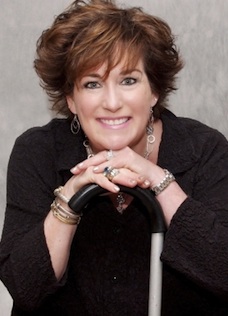 massive brain hemorrhage and paralyzing stroke at age 37. In a blink of an eye, Julia’s life was forever altered. Up till then Julia had been a multitasking working mother of a toddler; now, she was as dependent on others as a toddler. Before, she was climbing the corporate ladder; now she had to relearn how to climb stairs.
massive brain hemorrhage and paralyzing stroke at age 37. In a blink of an eye, Julia’s life was forever altered. Up till then Julia had been a multitasking working mother of a toddler; now, she was as dependent on others as a toddler. Before, she was climbing the corporate ladder; now she had to relearn how to climb stairs.
She was told she would probably die. Although she had some kind and compassionate interactions with nurses, aids and therapists, she was often treated dismissively by other caregivers who regarded her as an object rather than a person. Medical professionals frequently talked about her within hearing distance as if she wasn’t there. Despite staff attitudes ranging from arrogance to apathy, she survived the dismissive ones, whom she nicknamed Dr. Jerk, Dr. Panic, and Nurse Doom. And on the other hand, she was heard and acknowledged by one person, the kind, gifted Dr. Neuro, who promised her that he would treat her mind as well as her body.
Or, at least what was left of her body. She was completely paralyzed on the left side. She could not sit up on her own, feed herself, or go to the bathroom alone. The entire left side of her body was flaccid and numb. The left side of her body no longer existed in her mind. The left side of her face drooped like a melted candle. Her left eye remained open and emotionless along with her half shaved, surgery-scarred head. And her useless left arm would dangle out of the socket. One side not working put her whole body out of kilter — lopsided is an understatement; being still was as much of a challenge as moving.
On top of that, Dr. Jerk insisted on treating her for an extremely rare disease that Julia felt instinctively that she did not have. While that doctor was adamant about treating her for this disease that had no cure and would require lifetime treatment, ongoing testing was inconclusive. Julia knew that she knew her body better than any doctor. “I tell audiences,” she said, “not to give their power away to people with degrees. We’ve been in our bodies 24/7, and that is a degree — in on-the-job training. I do know what’s going on in my body, and if a doctor sits down and spends enough time with me, she will know, too.”
Although Julia was a patient who listened to her body’s signals, and wasn’t afraid to speak up, her opinions — and in particular her determination to recover, believe it or not — were routinely ignored or misinterpreted. “I was repeatedly told I was in denial,” she said about the responses to her determination to recover, “but there’s a fine line between denial and determination. I was determined to get better despite what the medical ‘experts’ were telling me, and so I pushed back with a vengeance.” She also had the steadfast support of her husband, Jim, who knew what a determined person she is, plus family, and friends, and she was driven further by a fiery love for her son, Rory, who was only 3 years old when the stroke occurred.
Irony Works
But that wasn’t all: she came into all this with an edgy sense of irony, and she threw that into the struggle as well, developing the hospital equivalent of battlefield humor that helped keep her going and sharp. As she soldiered on in a quest to heal and get out of the hospital, she also took on the cause of awakening her caregivers to the need to treat her as a human being, not as a routine piece of their jobs.
Listening to Julia speak, you’ll hear her indomitable spirit and irrepressible sense of humor shining through: If a doctor said you were going to die, would you look him straight in the eye and deadpan, “Oh, and you’re not?” Would you throw a party to pay homage to your hemorrhage? Ever thought about needing two hands to give the finger? Is half a brain truly better than none?
The serious questions that haunted her, even as she faced the world bravely turned into stand-up comedy — like so much of our comedy, it was rooted in tragedy.
She kept up that determination and that wit through many, long months of hospitalization and rehab until — with the help of family, friends and her determination — Julia not only got 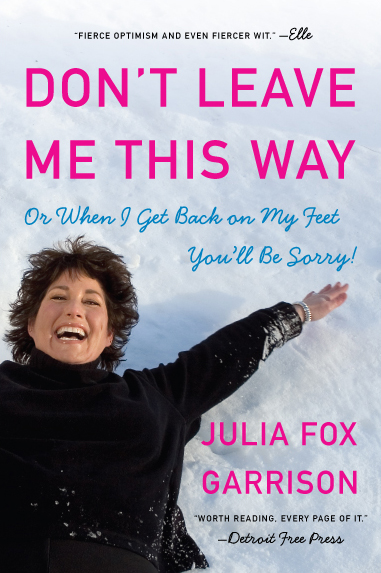 herself into a wheelchair, she got back out of it, and eventually, she got back home where she faced many more challenges.
herself into a wheelchair, she got back out of it, and eventually, she got back home where she faced many more challenges.
Today she stands proudly, taking the stage as a catalyst for the movement to integrate humanity into medicine. Her message is timely and effective. Partially as a result of persuasive reports like hers, medical schools are starting to recognize the importance of the doctor/patient relationship. Patient-centered care and user-driven healthcare, once convenient catch phrases, are now in the forefront thanks to the efforts of champions like Julia who demand acknowledgement that there is a human being inside every patient.
She has often carried this message to medical conferences, where she has enlightened survivors, caregivers, and professionals. Her story of personal triumph against overwhelming odds is a promising match for any association, business or community group looking for an inspirational, motivational speaker with a vivid and important message for their medical staffs and members as well as for the general public.
Julia’s presentations do not focus on stroke nor how stroke manifests; but how her stroke educated her in the fundamental life lessons of being empowered and overcoming when the intruder, called adversity, knocks at your door. Julia delivers those lessons with gut-wrenching honesty, peppered with samples of that life-saving irreverent humor.
Although she can offer CEU/CME credits for professionals, what she has to say applies to anyone facing a life challenge: people with health issues, people with stress in their lives, people who are depressed or overwhelmed or faced with difficulties. In other words, to all of us.
Dr. Oz said of her book, “A stroke (literally) of luck helped Julia define the essence of her life. Her inspirational story can help us find ours.”
What I find profound and especially interesting about Julia’s story is that it resonates so much with what I’m hearing like a new song from many sources — about how patients (human beings), must stand up for ourselves, listen to our intuition, stick to it, and engage in a two-way conversation with our healthcare professionals — not just blindly follow a doctor’s orders.
Julia is feisty, and I admire that in a person. Your audiences will too. Her humor and her grit will bring them to their feet applauding while inspiring them to emulate her. No one will be untouched. To learn more about bringing her in to spark your community event or conference, give me a call at 503-699-5031 or email me barbara@speakwellbeing.com
May is Stroke Awareness Month
Stroke is an emergency. It’s important to learn stroke warning signs and how to respond to them. The FDA has approved clot-buster medication that, if given within three hours of the first symptom, may reduce long-term disability for the most common type of stroke.
Use the acronym, FAST, to remember the warning signs of stroke: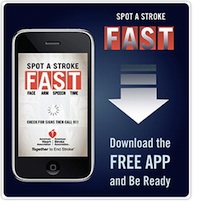
FACE: Ask the person to smile. Does one side of the face droop?
ARMS: Ask the person to raise both arms. Does one arm drift downward?
SPEECH: Ask the person to repeat a simple phrase. Is their speech slurred or strange?
TIME: If you observe any of these signs, call 9-1-1 immediately.
There’s even a brand new App for that – free – from the American Heart Association. Look up “Stop A Stroke Fast” in Apps and get it on your android or iPhone.
Lost in the Woods – Well, Almost Lost
Have you ever started on one path, unintentionally taken a wrong turn, and, even though your instincts were telling you otherwise, kept going — in the wrong direction? I hope I’m a little wiser for the experience my husband and I had two weekends ago while hiking in the Cascade Mountains. The 4-hour excursion we had planned turned into a scary (we thought we might possibly be lost) and physically challenging (very steep hills) outing.

It all started with a new trail guidebook for the Columbia River Gorge, one of our favorite places to hike. One of the features of this book is that it has a lot of hikes beyond the popular trails that are easily accessible from Portland. So for the second hike of this season, we headed for the top of Aldrich Butte on the Washington side of the river. The book described a 4-mile loop (1,100 feet elevation gain), up and then around the mountain — instead of out and back. We got up to the butte, ate our lunch while enjoying the spectacular view of the Columbia and Bonneville Dam below us, and then confidently headed down, taking, as directed, the turnoff .3 mile from the top, for the loop route back. Down, down, down we went.
Now, two things. First, I think it takes getting used to someone else’s directions — especially when the trails are unmarked, and they’re directing you to take unmarked trails. You have to learn how to interpret the author’s way of giving directions. Second, things just look different in the woods than they do on paper. (I mean, c’mon, do you really think a large stump is a good landmark in the woods?) Without going into detail about how we mis-read directions, I’ll just say we missed the next turn for the loop trail.

It was new territory so it all looked vague and beautiful. We just kept walking — you know, discovering — despite this little voice in my head that was telling me we were headed in the wrong direction. Eventually, we could hear and see a major waterfall in the distance, and although my mouth was saying, “Don’t you think he would have mentioned that in the guidebook?”, our bodies kept walking and took the steep downhill trail that led to the bottom of the falls — thinking surely that it would lead us out. Well, the 70-foot waterfall was gorgeous, and when I found it on the internet the next day, I learned it is indeed remote — not many people have visited it. The trail down was, however, a dead end, and realizing that we were going to have to retrace our steps back up all of the steep downhills we had just descended, I was an unhappy camper — too preoccupied with what was ahead, to enjoy the pristine beauty.
We started trudging straight back up that steep ridgeback, but on the way we took two more wrong turns (downhill-uphill), and that was when we realized that daylight was waning, that we could possibly be lost, and that our emergency supplies were inadequate. There was nothing to do but keep going. One more backtrack and we found our way back to recognizable territory, and eventually came upon the place where we had missed the turn. The rest of the hike would have been pleasant if it had been shorter o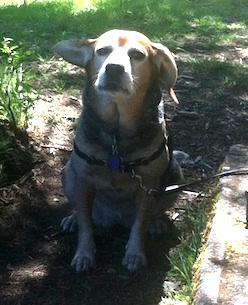 r level – and if we weren’t so tired we could barely get one foot in front of the other. Even 4-legged Bella, our beagle, was tuckered out. By the time we spotted our car we had walked uphill-downhill-uphill almost 8 hours, and I have never been so happy to sit down on the back hatch of my Subaru and take off my boots. Oh, my aching body.
r level – and if we weren’t so tired we could barely get one foot in front of the other. Even 4-legged Bella, our beagle, was tuckered out. By the time we spotted our car we had walked uphill-downhill-uphill almost 8 hours, and I have never been so happy to sit down on the back hatch of my Subaru and take off my boots. Oh, my aching body.
It took days to recover. I skipped yoga Monday morning, and on Wednesday, still aching, told my yoga class that I had a hiking hangover. I’m promising myself that next time I’ll pay more attention to my instincts than to my commitment to the path, and we’ll definitely go better prepared. In any case, it’s a hike that will not soon be forgotten!
Until next time, take care of yourself for your well being and those you love.
Yours truly,
Barbara
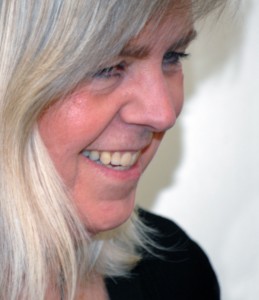 For Your Well Being is published bi-weekly. We bring you insider speaker reports, exclusive stories about special events around the country, meeting planner tips, and fun stuff from the worlds of health and well being. Be well and be in the know!
For Your Well Being is published bi-weekly. We bring you insider speaker reports, exclusive stories about special events around the country, meeting planner tips, and fun stuff from the worlds of health and well being. Be well and be in the know!
The Speak Well Being Group is a specialized speakers bureau, focusing on speakers for hospital-sponsored community events, healthcare organizations, conferences and women’s groups. Our speakers are hand-selected. They are not only experts in their fields, they know how to connect with women and give them life-changing information served on a silver platter of joy, camaraderie, with a side of sauce (spicy, of course).
Finding the perfect keynote speaker for your special event or conference is my personal passion, not just once, but year after year. It brings me endless joy to know that your audience was delighted and moved by the speaker we selected together. I’m committed to making the process easy, pleasant and fun.
